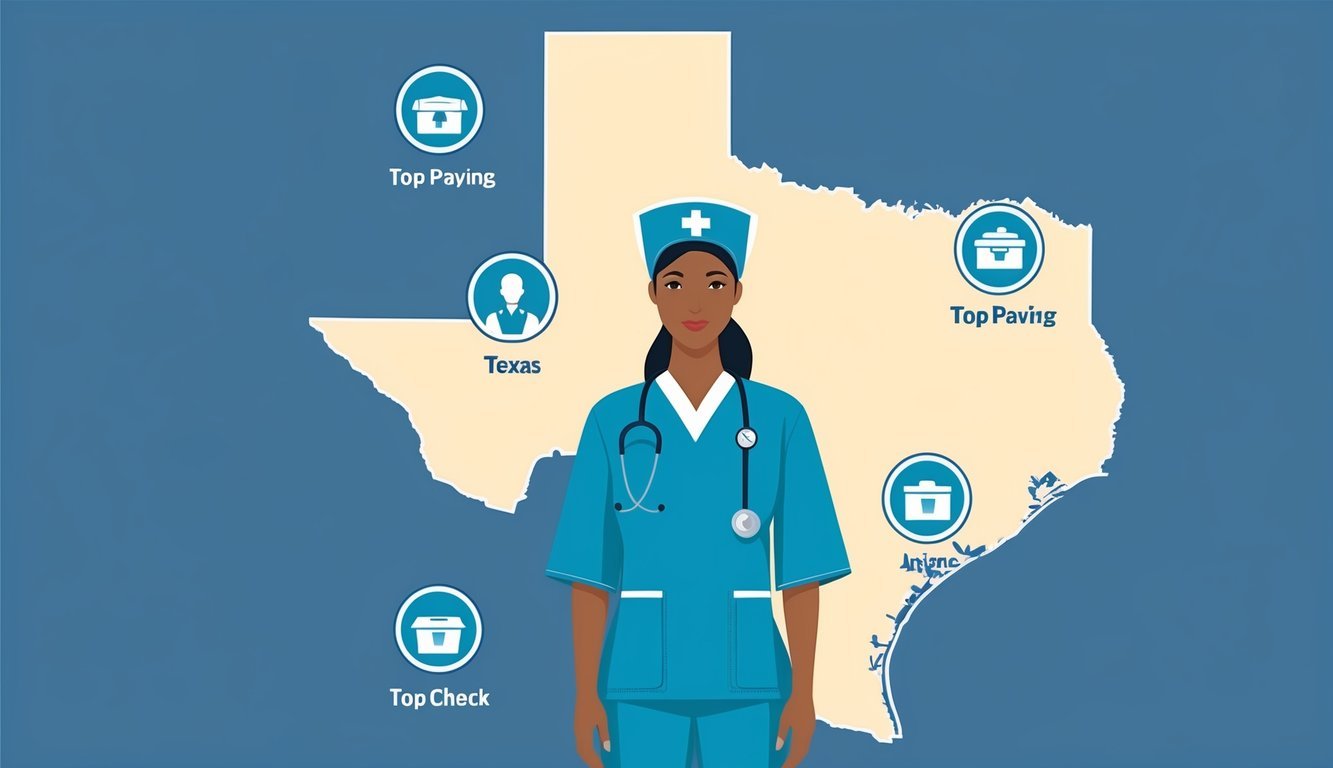When considering a career as a Registered Nurse (RN) in Texas, you must understand the financial aspects. The average annual salary for RNs in Texas is approximately $79,820.
This makes it a competitive choice for those entering the healthcare field.
Your earnings may vary based on factors such as location, experience, and education level.
In Texas, a variety of healthcare facilities and specialties can influence your salary potential.
For instance, urban areas typically offer higher pay compared to rural settings.
Additionally, RNs can boost their earnings through overtime and specialty certifications.
You may also find that your salary aligns with national trends, yet local demand plays a vital role in shaping your income.
By exploring the current salary landscape, you can make informed decisions regarding your career path.
Consider checking out resources like Indeed for the latest salary updates and job openings in Texas.
Understanding these factors will help you navigate your nursing career with clarity and purpose.
Overview of Registered Nurse Salaries in Texas
In Texas, the salary of Registered Nurses (RNs) is influenced by various factors, and it is important to understand how these elements affect your potential earnings.
Additionally, comparing these salaries to the national average provides context about the state’s employment landscape.
Factors Influencing RN Salaries
Several factors impact the RN salary in Texas.
Key variables include:
-
Experience Level: Entry-level RNs may earn less compared to their more experienced peers. For example, a new graduate might start around $69,362, while seasoned RNs with years of experience can earn significantly more.
-
Location: Salaries can vary by region within Texas. Urban areas often offer higher wages due to increased demand and higher living costs.
-
Education and Certification: RNs with advanced degrees or specialized certifications typically command higher salaries.
-
Employer Type: Salaries may differ based on whether you work in hospitals, clinics, or other healthcare facilities.
These factors contribute to a total pay range that may vary significantly among RNs across the state.
Comparison to National Average
The average RN salary in Texas is approximately $79,820, which is lower than the national average of $89,010.
This disparity reflects local market conditions and cost of living adjustments.
To provide a clearer picture, here are average salaries based on percentile ranges:
| Percentile | Annual Salary |
|---|---|
| 10th Percentile | $14,441 |
| Average (50th) | $79,820 |
| 90th Percentile | $139,749 |
These figures illustrate that while Texas has competitive salaries, there are opportunities for higher earnings in specific roles or locations.
For further details about salaries for RNs in Texas, you can refer to resources like NurseJournal.
Advanced Nursing Roles and Salaries

Advanced nursing roles significantly impact the healthcare sector, particularly in Texas.
These positions often offer higher compensation compared to traditional nursing roles, reflecting the specialized skills and education required.
Nurse Practitioner Compensation
Nurse Practitioners (NPs) are essential in many healthcare settings.
In Texas, the average salary for a Nurse Practitioner can range from $95,000 to $120,000 annually, depending on experience and specialty.
Factors affecting NP salaries include:
- Experience: More experienced NPs typically earn higher wages.
- Specialty: NPs in high-demand fields, such as acute care or psychiatry, often command higher salaries.
- Location: Urban areas may offer better compensation compared to rural regions.
Nurse Practitioners often hold a Master of Science in Nursing (MSN) and are able to diagnose conditions, prescribe medications, and provide treatment plans, enhancing their value in the healthcare job market.
For further insights, you can explore more about Nurse Practitioner salaries.
Nurse Anesthetist Earnings
Nurse Anesthetists, or Certified Registered Nurse Anesthetists (CRNAs), are among the highest-paid nursing professionals.
In Texas, their salaries can range from $150,000 to over $200,000 annually.
Key factors influencing CRNA salaries include:
- Experience Level: Newer CRNAs may start at the lower end of the salary spectrum, while seasoned professionals can earn significantly more.
- Employment Setting: CRNAs working in surgical centers may earn differently compared to those in hospitals.
- Geographic Location: Areas with high demand for anesthesia services tend to offer higher salaries.
CRNAs typically have a master’s or doctoral degree in nursing with a specialization in anesthesia, making them highly skilled providers in the field.
For detailed salary dynamics, check out CRNA earnings information.
Additional Compensation for RNs

Registered Nurses (RNs) in Texas often benefit from various forms of additional compensation that can enhance their overall earnings.
This includes opportunities for overtime pay, bonuses, and other incentives that may be available depending on your employer and specific job role.
Understanding Overtime Pay
As an RN, you may have the chance to earn overtime pay when you work beyond your regular schedule.
In Texas, nurses are typically entitled to receive at least 1.5 times their standard hourly wage for hours worked over 40 in a week.
This can significantly boost your income, especially in high-demand settings or during staffing shortages.
- Hourly Rate Example: If your standard rate is $30 per hour, your overtime pay would be $45 per hour.
- Job Security: Overtime opportunities often arise during peak times, helping to ensure job security and consistent hours.
Always check your specific employer’s policies and the state labor regulations for detailed information.
Bonuses and Incentives
Bonuses and incentives can vary based on the healthcare facility and your performance.
Many employers offer cash bonuses for meeting certain goals or metrics, such as patient satisfaction ratings or successful completion of certifications.
Common Types of Bonuses:
| Bonus Type | Description |
|---|---|
| Sign-On Bonuses | Offered to new hires to attract talent. |
| Referral Bonuses | Incentives for referring other qualified nurses. |
| Performance Bonuses | Based on individual or team performance metrics. |
Additionally, some facilities may provide profit-sharing models or commission structures tied to specific roles, especially in specialized nursing.
Being aware of these additional compensation avenues can aid you in maximizing your earnings as an RN in Texas.
Always explore your employment options and discuss possible compensation packages with potential employers.
Top Paying Employers and Locations

Understanding where you can earn the most as a Registered Nurse (RN) in Texas is crucial for making informed career choices.
Certain employers and regions offer notably higher salaries based on various factors, including the type of healthcare facility and geographic location.
High-Paying Sectors for RNs
In Texas, RNs often find higher salaries in critical care settings.
The Intensive Care Unit (ICU) is one such area where RNs can command competitive pay.
Here’s a table highlighting some of the high-paying sectors along with average salaries:
| Sector | Average Salary |
|---|---|
| ICU | $100,000 |
| Emergency Room | $94,000 |
| Surgical Unit | $90,000 |
| Travel Nursing | $115,000 |
| Home Health Care | $85,000 |
Top employers like HCA Healthcare and Ascension Texas frequently offer salaries at the upper end of this spectrum.
Additionally, specialized units in hospitals can also lead to increased compensation.
Geographic Variations in RN Pay
Geography plays a pivotal role in RN salaries across Texas.
Urban areas, particularly cities like Houston, Dallas, and Austin, tend to provide higher wages than rural locations.
The following table summarizes average RN salaries in various cities:
| Location | Average RN Salary |
|---|---|
| Houston | $85,000 |
| Dallas | $83,000 |
| Austin | $82,500 |
| San Antonio | $78,000 |
| Fort Worth | $80,000 |
In addition to city salaries, specialty facilities and teaching hospitals often provide added incentives, including bonuses and benefits.
This makes location a vital factor in maximizing your RN earning potential.
For further details on salaries and employer specifics, explore additional resources on nursing salaries.
Negotiating Your RN Salary in Texas
Negotiating your salary as a registered nurse (RN) in Texas involves understanding market dynamics and leveraging your qualifications effectively.
This section explores key strategies and how your education and experience can add value to your negotiation process.
Key Negotiation Strategies
Before entering salary discussions, research the average salary for RNs in Texas.
This includes understanding variations based on experience and location.
Create a list of your unique skills, certifications, and achievements to present during negotiations.
Then, consider timing; approach salary discussions after receiving a job offer or during performance reviews.
Be prepared to articulate your contributions to the organization, especially if you have specialized training, such as a Bachelor of Science in Nursing (BSN).
Lastly, use data from reputable sources to substantiate your request.
Negotiation isn’t just about stating a number; it’s about demonstrating worth.
Always express gratitude for the opportunity, even while advocating for a higher salary.
Leveraging Education and Experience
Your level of education and relevant experience play a significant role in salary negotiations.
A Bachelor of Science in Nursing can enhance your prospects, often resulting in a higher starting salary compared to an associate degree holder.
Experience, especially in specialized areas such as critical care or pediatrics, can justify a higher salary request.
Long hours and demanding work environments are common in nursing.
Highlight any leadership roles, certifications, or additional training that demonstrate your commitment and expertise.
By clearly communicating your qualifications, you position yourself as a valuable asset to the employer.
This strategy will help you negotiate a salary that reflects your skills and the demands of the job.
For additional resources on effective salary negotiation, visit sites like Nurse.org and Glassdoor.

